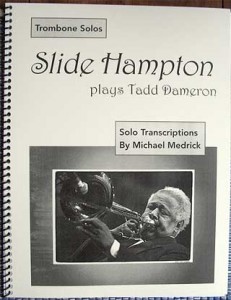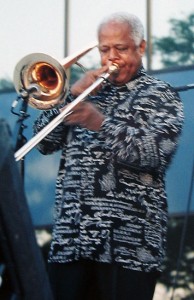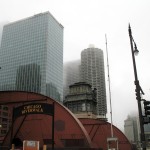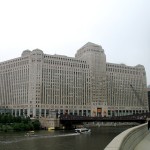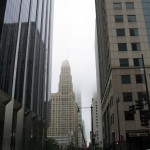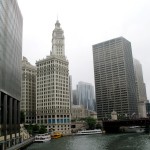Happy New Year to all those who came by this website in 2013, and even those who didn’t. Sorry Commander Trombone wasn’t updated more often. I’ll endeavor to do something about that this year. Maybe a nine part series on trombone slide lubrication? Or slide maintenance? It’s a simple process, really, but you’re going to need a belt sander and your own lathe . . .
Slide Hampton Plays Tadd Dameron
A book of solo transcriptions by Mike Medrick
As has been mentioned here before, in the 80s I was fortunate enough to attend The University of Tennessee for music school. It has to be admitted that my first university ensemble was the Pride of the Southland Marching Band. While that was a life-transforming experience, I was soon on to greener pastures in UT ensembles that were 1) more edifying, and 2) actually more fun.
One of these ensembles was the UT Trombone Choir, which played in both the jazz and western-art-music traditions. It was directed by the trombone professor, Don Hough. Importantly, in the recent past previous to my joining the trombone choir, that ensemble had achieved a remarkable claim to fame by playing and performing with legendary jazz trombonist Slide Hampton. There was a cassette tape of the resulting UT Music Hall performance that was passed from trombonist hand to trombonist hand (no mp3s then, you ungrateful kids). On the basis of everyone’s experience with Slide’s visit, it was apparent that he 1) was pretty cool, 2) was also one of the most avid practicers in jazz, on the order of John Coltrane or Booker Little, 3) was a pretty amazing practitioner of the style of jazz referred to as “be-bop” on the slide trombone, 4) and had considerable skill as an arranger and orchestrator.
Mike Medrick, a soon-to-be trombonist chum who joined the Trombone Choir a short time later, also thought Slide was great. We’d often discuss jazz recordings. J.J.? As much as you could get your hands on. Slide on A Day in Copenhagen? A must-have. Mike was (and is) an avid arranger, and he soon was writing for both the trombone choir and UT jazz ensemble.
In the jazz program at UT run by Jerry Coker (did I mention this? The jazz department was run by Jerry Coker!), we did solo transcriptions for Coker’s Jazz Styles and Analysis class. Through Jerry, it became clear to us (if it wasn’t already) that one of the best ways to learn the nuts and bolts of jazz music is to listen to, take note of, and study what has been performed by the great practitioners of the music.
Now, just like in Back to the Future, a fair amount of time has gone by, and quickly. But the great lessons and ideas are more like constants. Accordingly, my friend Mike Medrick is back from the future with a wonderful book filled with Slide Hampton solo transcriptions. If you are any sort of musically literate student of jazz — not necessarily a trombonist — this book is well worth investigating. (See the sidebar for how to get a copy.)
Chicago, June 2013
Recently visited Chicago, the City of the Big Shoulders. One of the days was foggy. How did that fog come in? On little cat feet, maybe? It was gone the next day. Click a photo for a larger version.
High Flight
Back when I was in high school in the late 70s, television stations actually ended broadcast for the day. What often directly preceded the impending
TV “snow” was the poem heard in the video below, High Flight, by aviator John Gillespie. The short film depicted an airplane doing all kinds of tricky maneuvers as the poem’s words were intoned. Yeah. If you were going to “Slip the Surly Bonds of Earth,” this was how you did it, in a shiny, American, cold-war airplane. It’s still unclear to me what any of it had to do with signing off, but what it actually meant was, “Look — the broadcast day is over. This station has done all it can for you today. No more Petticoat Junction reruns. Nothing more to see here until 6 am. Get some sleep. Goodnight.”
Larry McCabe: Irish American
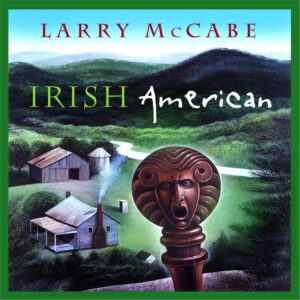 Out of musicians I get to perform with on a regular basis, one of the most special is fellow trombonist Larry McCabe. He probably wouldn’t object to being called, first and foremost, a wailer of the blues on the slide instrument. But, it’s important to note that while the blues informs almost everything he plays, there’s a lot more to Larry’s musical sensibilities than the blues alone. Just one of those sensibilities involves a love for the music of his Irish ancestors. So, it isn’t too surprising that his latest set of recordings is titled Irish American. The other influences? Well, I’d just check the music out. Also, see here!
Out of musicians I get to perform with on a regular basis, one of the most special is fellow trombonist Larry McCabe. He probably wouldn’t object to being called, first and foremost, a wailer of the blues on the slide instrument. But, it’s important to note that while the blues informs almost everything he plays, there’s a lot more to Larry’s musical sensibilities than the blues alone. Just one of those sensibilities involves a love for the music of his Irish ancestors. So, it isn’t too surprising that his latest set of recordings is titled Irish American. The other influences? Well, I’d just check the music out. Also, see here!
Also, see here!

